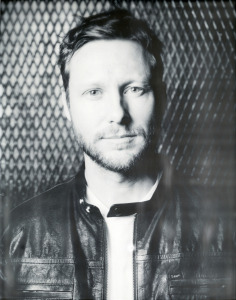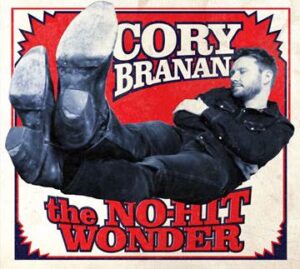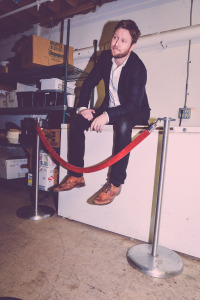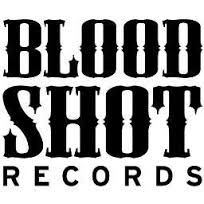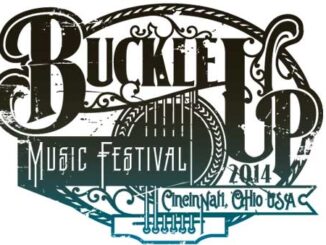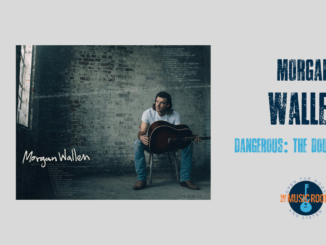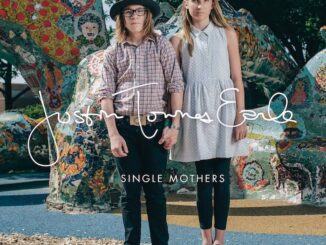About two months ago we had the pleasure of sharing our thoughts on Cory Branan’s new record, “The No-Hit Wonder” with you (read the review here). We loved the record so much that when we heard he was going to be playing The Drinkery OTR in Cincinnati we reached out to see if he would be up for chatting with us. I was very fortunate to speak to Cory over the phone in what turned out to be a very enjoyable conversation. We talked about him being named one of the best new artists twice in a decade, Jason Isbell’s Scrabble skills, and most importantly…we talked music. Hopefully you will enjoy reading this interview as much as I did conducting it! Be sure to check Cory out on October 18th at The Drinkery OTR!!
The Music Room: Hey Cory, thanks for taking time to talk with us today. First off, congratulations on the new record (The No-Hit Wonder). It is an awesome record and I am just blown away by it. Now that it has been out for a couple of months, how has the reception to it been?
Cory Branan: It’s doing well. I’ve been out touring. Some of the towns that I kind of hit a wall in where I thought it was never going to get any better, eventually…actually they have doubled. So the kids are coming out, so yeah it’s fun. Right now I’m actually out with Against Me and Gaslight Anthem, so that’s a fun one too.
TMR: I saw that Rolling Stone Country actually named you as one of the top ten NEW artists to watch (laughter from Cory). Considering you have been a recording artist for over a decade, how does that make you feel?
CB: It just cracks me up really…mainly. Especially since Rolling Stone in 2002 or 2003 put me on their “hot list” (laughter) in the same magazine. So it’s funny you know? I have been doing this so long that I’ve outlasted clubs, promoters and stuff…it’s funny that I’m outlasting editors at magazines. I don’t know if they remember that they said that I was new in 2002. I’ll take it. I’ll take whatever I get.
TMR: Is it that kind of thing that went into naming the record “The No-Hit Wonder?” Was it a tongue in cheek kind of thing, or something out of frustration?
CB: It was just a song. I balk at naming a record after a song usually. I just ended up doing it. It was really written for, and I’ve said it before, for all of my buddies who are out there doing this…just treading water. I have so many friends who are doing this. It’s a weird time for this. It’s never been an easy thing, but now it’s definitely….with people not buying records like they used to and the whole thing shifting to a less of a tangible thing. I think in five years we won’t own anything, it will all be curated. We’ll subscribe to our record collection. We’re in the middle of that and haven’t found a way to make careers happen out of that. So everyone’s treading water pretty hard. I don’t know, it’s just written for anyone out there, not just in music, but for anyone who’s not taking short cuts or following trends. Anybody who is sticking to their guns and doing what they believe in. It’s also obviously about me too. It’s my list of grievances (laughs). It’s definitely tongue in cheek.
TMR: That is one thing that we feel very strongly about is actually going out and buying music and holding it your hands. That seems to be a great thing about the Bloodshot label, the fact that they are releasing stuff on vinyl. I think that medium is certainly helping with some of that.
CB: Some, and actually there’s a huge resurgence. So much that I actually ripped through the first pressing of vinyl. Now it’s been on back order for a month and half. It’s a good problem to have, but it’s also like, come on guys, I’m on tour without vinyl. There are still variables there. It’s still a pain in the ass. It costs a lot to make, and it’s heavy. It’s so funny ‘cause kids are like, “It just sounds better.” I’m like well…yes and no. It sounds better on a hi-fi, but no one has a hi-fi anymore…no one has a stereo receiver anymore. That little thing that you bought at Urban Outfitters, it does not sound better than your iPod. It’s all relative.
TMR: I think that one positive about the change in the music scene is that there is freedom to do more things. You don’t necessarily have to stick to one label. When I listen to your record I hear Cash. I hear Petty, Seger, Roger Miller and SunVolt. I hear I all kinds of different influences that make it hard to pin down your music to one genre. Who are your influences?
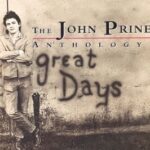 CB: Everybody you just named I love (laughs). I grew up listening to…When I first discovered John Prine, I didn’t discover one record, I discovered his anthology “Great Days.” I think I might have grabbed a few too many greatest hits records growing up. Where you hear the whole artists career and how they changed on record. I like to do that on one record. The songs aren’t hits mind you, but I like records that do a lot of things. It’s just me writing me and I have the call on what they end of being. I just let the songs dictate where they want to go. I try not to enforce things. I try not to be like this is going to be this kind of record. I did sort of notice that this record was becoming a roots record. Some of the old ones that I’ve written that would fit that like “Sour Mash,” “Mean Time Blues” and “Skywriter” those are old songs. They just never fit what I was doing before. I was like, here’s there home here.
CB: Everybody you just named I love (laughs). I grew up listening to…When I first discovered John Prine, I didn’t discover one record, I discovered his anthology “Great Days.” I think I might have grabbed a few too many greatest hits records growing up. Where you hear the whole artists career and how they changed on record. I like to do that on one record. The songs aren’t hits mind you, but I like records that do a lot of things. It’s just me writing me and I have the call on what they end of being. I just let the songs dictate where they want to go. I try not to enforce things. I try not to be like this is going to be this kind of record. I did sort of notice that this record was becoming a roots record. Some of the old ones that I’ve written that would fit that like “Sour Mash,” “Mean Time Blues” and “Skywriter” those are old songs. They just never fit what I was doing before. I was like, here’s there home here.
TMR: You just kind of answered my next question. This record did seem a little more honed in than the others. Do you think you have found your “nitch” as an artist, or do you still consider yourself a mutt? (Branan’s 2012 record was called “Mutt.”)
CB: Definitely a Mutt. I did notice this record was a little straighter of a record. I relaxed a little more about it. Now that I’m on Bloodshot and they want to release records, you know? Before I used to think I had to put everything on the record. All my records before were an hour long. I had to take fifteen minutes off of “Mutts” to fit it on vinyl and a download. This one I consciously made. I was, “Well, I’ll just make it fit on vinyl.” (Laughs) It’s still eleven songs. I don’t do a lot of solos, or extended musical jams. I did leave some air on this one here and there. There are some musical parts that go on a little ways. I said there’s no reason I can’t make this record in thirty or thirty-five minutes. I just tried to make one of those records that you want…or hopefully that you want to start over as soon as it’s done.
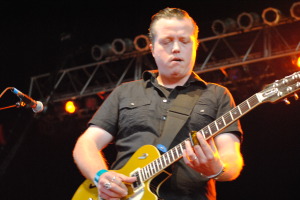
TMR: You have a guy out there in Jason Isbell, who might be the top guy when it comes to making true and honest music, who just can’t say enough good things about you. He even called you his favorite singer/songwriter.
CB: Yeah, Jason is a good dude. He’s a good buddy.
TMR: He’s on a couple tracks on the record. How did that come about?
CB: I just asked him to come by. His wife, Amanda, is an old, old friend of mine. They moved into Nashville and we just kind of hang out. For a while there it was Justin Townes Earl and his girlfriend and Jason and his wife, they would come over cause my wife’s a great cook. We’d just sit around and let Jason beat us at Scrabble. Boy has smarts for a guy from Alabama; you don’t want to play him at Scrabble.
(Laughter)
TMR: I’ll have to keep that in mind.
CB: So yeah, I just called some buddies up that I knew would fit each song. Jason, of course, would have fit every song on the record. But I had him in mind for “You Make Me,” and once he sang on that I was like, well, whiiiile you’re here….. cause he knocked it out so fast. He was real nice and let me borrow his beautiful Martin for “Skywritter.” So I played his Martin on that. He’s a real good dude.
TMR: With the three guys you just mentioned, Jason, Justin Townes Earle, and yourself, you have three of the best records out today. Next time you guys get together to jam make sure you hit record. That would be a hell of a jam session.
CB: (laughing) Like you said, we’re all out on a record, so we don’t get together much anymore. I’m actually touring with Justin next month.
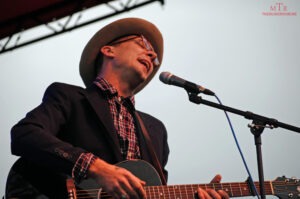
TMR: I know that there were four years in between “The Hell You say (2002) and “12 songs” (2006), and another six years between “12 Songs” and “Mutt” (2012). There were only two years between “Mutt” and “The No Hit Wonder.” Did that have to do with the Bloodshot deal.
CB: Absolutely. The reason before was just business. When my first record came out they sort of took a business hit and it was hard for me to get them to let me make the next record. The timeline on that is a little weird. The first one came out nationally in 2003 or 2002. Then 2006, so four years later was the second record. I actually recorded “Mutt” in 2010 but I didn’t have a label I just got it financed through someone. Then I had to shop “Mutt” for I think a whole year before Bloodshot picked it up. I thought I had a great record and I didn’t want to just throw it against the wall and have it disappear. And once they finally picked it up it took a while to get out. The timeline is trickier than it looks, but it was still a huge gap in between….way too big of a gap for me. I want to put out a record a year. The good thing is that I have eighty to a hundred songs that haven’t been recorded, so as I’m writing the new stuff I’ll always have stuff to pull. Maybe those songs will find a home. When I do a narrative/folk record the song “Sultana” that people know from shows will find its way on a record.
TMR: You have a show coming up here in Cincinnati this Saturday night at The Drinkery OTR. It will be my first opportunity to get to see you, probably along with a lot of other people. What can we expect from a Cory Branan live show?
CB: Just anything you want really. I never make a set list. I play a few off the top of my head and then anything anybody wants to hear.
TMR: So if I holler out “Shadow,” there’s a chance?
CB: Definitley!
See Cory Branan at The Drinkery OTR this Saturday night, October 18th!! Click here for details!!
Special thanks to the fine folks at

